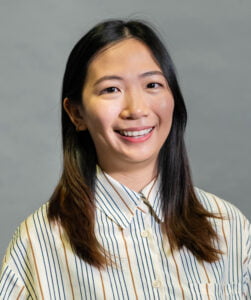Member Insight – Lisha Lin
 Introduction
Introduction
Hello! My name is Lisha Lin, and I am a PhD candidate in Epidemiologic Science at the University of Michigan School of Public Health. My research area mainly focuses on investigating the intricate interplay between the epigenome at different levels and health risk factors, including social, psychosocial, and neighborhood structure.
What sparked your decision to become an epidemiologist?
Growing up in a Chinese family with two healthcare workers, I always think about questions logically and enjoy analyzing their inner connection. I was familiar with the hospital’s atmosphere, where diseases and deaths are happening every day. At that time, I wanted to promote health and make fewer people suffer. In college, I chose Preventive Medicine as my major because I liked the concept of finding ways to promote health not only individually but also at a population level. In my fourth year, I studied Epidemiology and was fascinated by different epidemiological methods used to deal with various data types. Therefore, I went to the University of Michigan School of Public Health to further train myself in Epidemiology!
What do you see as the biggest obstacle facing epidemiologists in the next five years?
Misinformation and lack of trust between scientists and the public have been increasingly prevalent, and it will become more severe if no actions are taken. Social media facilitates rapid message dissemination but also fuels the spread of misinformation and rumors. Collaborative efforts across disciplines are essential to provide accurate scientific interpretations to the public efficiently!
Do you have any pets?
Yes! We have three adopted cats, and they are the cutest! Imagine cats that never mess up with wires and plants, I am so lucky! We also have two guinea pigs, and bunch of fish. I enjoy their company a lot, especially when the work-from-home mode has occupied a lot of time in my daily routine.
Why did you join SER? What keeps you coming back?
I joined SER in 2022 because my abstract was accepted, and my supervisor kindly sent me to Portland, OR to present our work. (Thanks, Jen!) After reaching out to so many wonderful scholars from various fields, I am deeply grateful to this platform, as it helps me connect with people outside of my institute. Now I serve as the Education Co-Chair for SER Student-and-Postdoc Committee (SPC), and I enjoy serving our community to help more scholars find the academic society that suits them the most, gives back the most, and that they can call “home”.
What advice do you give students who want to become epidemiologists?
Firstly, don’t be afraid to step forward and embrace mistakes! They’re a natural part of being human. What truly matters is learning from these experiences and using them to grow stronger. Secondly, learn from others. In the realm of epidemiology, teams comprise professionals from diverse areas, making teamwork invaluable. Collaboration is essential for improving public health outcomes. Last but not least, hone your ability to integrate information. As epidemiologists, delving into literature and discerning findings is crucial. Filtering and synthesizing information enables us to deliver the most helpful messages to the public.
Outside of epidemiology what do you enjoy doing?
I enjoy many fiber-related activities, including knitting and spinning. I am also a gamer! Video games are my favorite.
What is something that not many people know about you?
I used to be a surgery assistant when interning in the General Surgery Department in a hospital!
